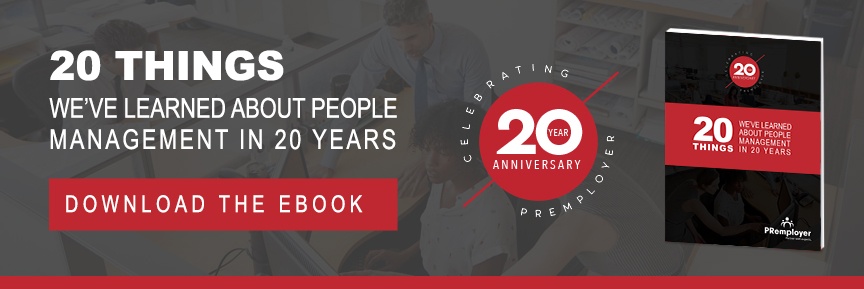
Many employers worry about what will happen when they transition to a Professional Employer Organization (PEO). Will it have a negative impact on their employees? Will employees struggle to make that important transition?
In reality, all available evidence shows that employees of firms partnered with a PEO are more satisfied with their company across the board. In fact, employees in companies who partner with PEOs are more likely to:
-
Recommend the company to friends as a great place to work
-
State (and act as though) the company inspires their best performance
-
Remain in the same job until retirement; Employee turnover is around 10-14% lower for clients of PEOs
-
Rate HR efforts, hiring practices, and job design highly in surveys
-
Be engaged as an employee--something that well over half of employees struggle with
When making the transition to a PEO, the key is to set expectations correctly. Before shifting into the partnership, take the time to clearly answer the objections and questions employees are most likely to have. This sets them up to understand what the transition looks like and how it has the potential to impact them.
Here are some questions to expect from employees:
Why not just hire more in-house HR employees?
While in-house HR employees can offer a number of advantages to your employees and to your business, PEOs can often offer more. Consider:
PEOs offer cost savings for the employer on healthcare plans and benefits. PEOs can give the company access to healthcare plans and benefits at prices that were negotiated at scale by experts. Typically, your business can't get these kinds of benefits on its own--but it can when you work with a PEO.
PEOs allow the in-house specialists to focus on core business. The PEO takes over HR activities like answering complex benefits administration questions--questions the in-house team may have to research much more extensively before answering or figuring out policies for the employee handbook. This means that the in-house team is able to resolve issues and concerns more efficiently.
PEOs can help keep up with changes in compliance regulations more effectively. In many industries, compliance regulations change swiftly and keeping up with them is a job unto itself. PEOs have compliance experts to ensure that the company does not accidentally violate a law or standard. Often, that includes keeping up with important employee benefits regulations.
What does it mean to outsource HR? Will we have new employees?
PEOs do not function like employee leasing: that is, you're not going to have new employees heading into your building. In most cases, HR support is off-site, rather than being contained within your current office environment. If you have questions, however, there are experts on call who can quickly answer questions about your benefits.
When you outsource HR, the PEO will help take care of several important tasks for the business and all its employees. This includes:
- Ensuring that the company stays compliant with laws and industry regulations
- Assisting with safety programs to comply with OSHA
- Navigating workers compensation and setting up the claim management process
All of these can provide substantial advantages to the company as a whole and to individual employees. By staying in compliance, you avoid costly fines and fees and keep employees safe.
What changes should we expect to the company culture?
The goal of a PEO is not to single-handedly change the company culture. Instead, its goal is to enable HR and employers to have the time they need to focus on creating a better company culture. The PEO provides the tools, but the tools are wielded by the business. Often, you'll notice positive changes to the company culture after bringing in a PEO, but those changes are based on the actions of employers and HR representatives.
What changes can we expect to our technology?
Depending on the services offered, employees may need to adjust to new technology in the form of improvements. It can, in some cases, take a few weeks to work out all of the bugs and get the team comfortable with the new technology. During that transition, however, the PEO will make sure representatives are on hand to help with every step of the process, ensuring that team members understand how the process works and how to make the most of that new technology.
What kind of track record do PEOs have for successfully helping clients?
98% of PEO clients would recommend PEOs to another small business. Most companies--including both business owners and employees--find that using a PEO is an incredibly successful way to manage those important HR tasks, reduce costs, and make sure employees have what they need.
PEOs are not a widely-understood concept, especially among employees. When you decide to make the transition for your business, your employees will likely have many questions. With comprehensive answers to those questions, however, many employees find that they're more comfortable with that choice for their business. Do your employees have other questions? Contact PRemployer to learn more.

